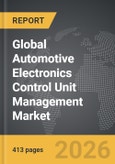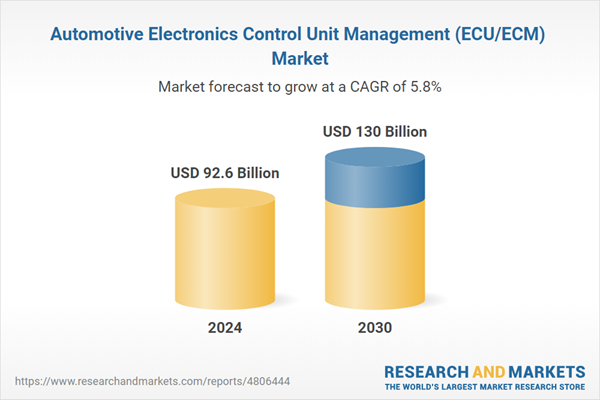Global Automotive Electronics Control Unit Management Market - Key Trends & Drivers Summarized
How Are Electronic Control Units (ECUs) Shaping Modern Vehicles?
Electronic Control Units (ECUs) are integral to modern automotive technology, managing a wide array of functions within vehicles. These units control everything from engine performance and fuel efficiency to safety systems and in-car entertainment. By processing data from various sensors, ECUs optimize vehicle operations, enhance performance, and ensure compliance with stringent emissions regulations. The integration of ECUs has enabled the development of advanced driver-assistance systems (ADAS), autonomous driving technologies, and enhanced connectivity features, transforming the driving experience. As vehicles become increasingly complex and feature-rich, the role of ECUs in ensuring seamless and efficient operation continues to expand.What Are the Challenges and Innovations in ECU Management?
Managing the growing number of ECUs in modern vehicles presents several challenges, including ensuring reliable communication between units, minimizing power consumption, and maintaining cybersecurity. The complexity of software and hardware integration requires robust testing and validation processes to prevent system failures and vulnerabilities. Innovations in ECU management are addressing these challenges through the development of multi-core processors, advanced software architectures, and secure communication protocols. The use of over-the-air (OTA) updates allows manufacturers to remotely update and improve ECU software, enhancing functionality and security without requiring physical access to the vehicle. These advancements are crucial for the continued evolution of automotive technology.How Is the Rise of Electric and Autonomous Vehicles Impacting ECU Management?
The rise of electric and autonomous vehicles is significantly impacting ECU management. Electric vehicles (EVs) rely heavily on ECUs to manage battery performance, energy efficiency, and regenerative braking systems. The need for efficient power management and real-time monitoring is driving innovations in ECU technology for EVs. Autonomous vehicles, with their reliance on sensors, cameras, and artificial intelligence, require sophisticated ECUs to process vast amounts of data and make real-time decisions. The integration of high-performance computing units and advanced algorithms is essential for enabling safe and reliable autonomous driving. These trends are pushing the boundaries of ECU technology and expanding its role in the automotive industry.What Factors Are Driving the Growth in the Automotive ECU Market?
The growth in the automotive ECU market is driven by several factors. The increasing demand for advanced safety features and driver assistance systems is a major driver, as these technologies rely on sophisticated ECUs. The shift towards electric and hybrid vehicles is also boosting demand, given the critical role of ECUs in managing electric powertrains. Technological advancements in connectivity and infotainment systems are further propelling market growth, as modern vehicles require advanced ECUs to support these features. Additionally, regulatory requirements for emissions control and vehicle safety are driving manufacturers to adopt more advanced ECUs. These factors collectively ensure the sustained growth and innovation in the automotive ECU market.Report Scope
The report analyzes the Automotive Electronics Control Unit Management (ECU/ECM) market, presented in terms of market value (USD). The analysis covers the key segments and geographic regions outlined below.- Segments: Application (Powertrain, Body, Chassis, ADAS & Safety, Other Applications); End-Use (Passenger Cars, Commercial Vehicles).
- Geographic Regions/Countries: World; USA; Canada; Japan; China; Europe; France; Germany; Italy; UK; Spain; Russia; Rest of Europe; Asia-Pacific; Australia; India; South Korea; Rest of Asia-Pacific; Latin America; Argentina; Brazil; Mexico; Rest of Latin America; Middle East; Iran; Israel; Saudi Arabia; UAE; Rest of Middle East; Africa.
Key Insights:
- Market Growth: Understand the significant growth trajectory of the Powertrain Application segment, which is expected to reach US$49.7 Billion by 2030 with a CAGR of 5.9%. The Body Application segment is also set to grow at 5% CAGR over the analysis period.
- Regional Analysis: Gain insights into the U.S. market, valued at $15.2 Billion in 2024, and China, forecasted to grow at an impressive 9.3% CAGR to reach $26.9 Billion by 2030. Discover growth trends in other key regions, including Japan, Canada, Germany, and the Asia-Pacific.
Why You Should Buy This Report:
- Detailed Market Analysis: Access a thorough analysis of the Global Automotive Electronics Control Unit Management (ECU/ECM) Market, covering all major geographic regions and market segments.
- Competitive Insights: Get an overview of the competitive landscape, including the market presence of major players across different geographies.
- Future Trends and Drivers: Understand the key trends and drivers shaping the future of the Global Automotive Electronics Control Unit Management (ECU/ECM) Market.
- Actionable Insights: Benefit from actionable insights that can help you identify new revenue opportunities and make strategic business decisions.
Key Questions Answered:
- How is the Global Automotive Electronics Control Unit Management (ECU/ECM) Market expected to evolve by 2030?
- What are the main drivers and restraints affecting the market?
- Which market segments will grow the most over the forecast period?
- How will market shares for different regions and segments change by 2030?
- Who are the leading players in the market, and what are their prospects?
Report Features:
- Comprehensive Market Data: Independent analysis of annual sales and market forecasts in US$ Million from 2024 to 2030.
- In-Depth Regional Analysis: Detailed insights into key markets, including the U.S., China, Japan, Canada, Europe, Asia-Pacific, Latin America, Middle East, and Africa.
- Company Profiles: Coverage of players such as Aptiv Plc, Continental AG, Denso Corporation, HELLA GmbH & Co. KGaA, Hitachi Automotive Systems Ltd and more.
- Complimentary Updates: Receive free report updates for one year to keep you informed of the latest market developments.
Some of the 43 companies featured in this Automotive Electronics Control Unit Management (ECU/ECM) market report include:
- Aptiv Plc
- Continental AG
- Denso Corporation
- HELLA GmbH & Co. KGaA
- Hitachi Automotive Systems Ltd
- Lear Corporation
- Magna International Inc.
- NXP Semiconductors N.V.
- Panasonic Industry Co., Ltd.
- Robert Bosch GmbH
- Valeo Inc.
- ZF Friedrichshafen AG
This edition integrates the latest global trade and economic shifts into comprehensive market analysis. Key updates include:
- Tariff and Trade Impact: Insights into global tariff negotiations across 180+ countries, with analysis of supply chain turbulence, sourcing disruptions, and geographic realignment. Special focus on 2025 as a pivotal year for trade tensions, including updated perspectives on the Trump-era tariffs.
- Adjusted Forecasts and Analytics: Revised global and regional market forecasts through 2030, incorporating tariff effects, economic uncertainty, and structural changes in globalization. Includes historical analysis from 2015 to 2023.
- Strategic Market Dynamics: Evaluation of revised market prospects, regional outlooks, and key economic indicators such as population and urbanization trends.
- Innovation & Technology Trends: Latest developments in product and process innovation, emerging technologies, and key industry drivers shaping the competitive landscape.
- Competitive Intelligence: Updated global market share estimates for 2025, competitive positioning of major players (Strong/Active/Niche/Trivial), and refined focus on leading global brands and core players.
- Expert Insight & Commentary: Strategic analysis from economists, trade experts, and domain specialists to contextualize market shifts and identify emerging opportunities.
Table of Contents
Companies Mentioned (Partial List)
A selection of companies mentioned in this report includes, but is not limited to:
- Aptiv Plc
- Continental AG
- Denso Corporation
- HELLA GmbH & Co. KGaA
- Hitachi Automotive Systems Ltd
- Lear Corporation
- Magna International Inc.
- NXP Semiconductors N.V.
- Panasonic Industry Co., Ltd.
- Robert Bosch GmbH
- Valeo Inc.
- ZF Friedrichshafen AG
Table Information
| Report Attribute | Details |
|---|---|
| No. of Pages | 413 |
| Published | January 2026 |
| Forecast Period | 2024 - 2030 |
| Estimated Market Value ( USD | $ 92.6 Billion |
| Forecasted Market Value ( USD | $ 130 Billion |
| Compound Annual Growth Rate | 5.8% |
| Regions Covered | Global |









